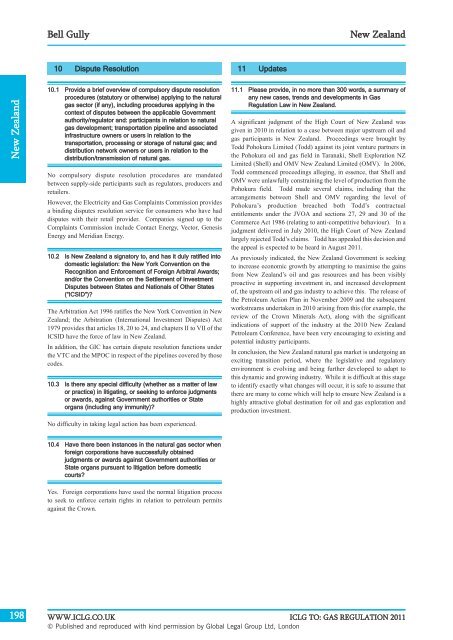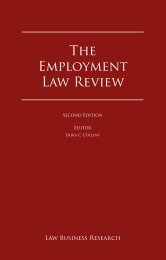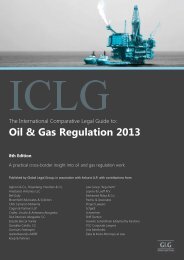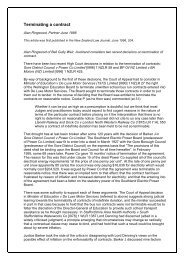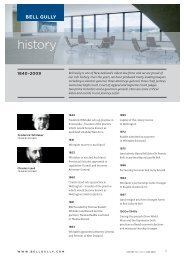Zealand
Gas Regulation 2011 - Bell Gully
Gas Regulation 2011 - Bell Gully
- No tags were found...
Create successful ePaper yourself
Turn your PDF publications into a flip-book with our unique Google optimized e-Paper software.
Bell Gully<br />
New <strong>Zealand</strong><br />
10 Dispute Resolution<br />
11 Updates<br />
New <strong>Zealand</strong><br />
10.1 Provide a brief overview of compulsory dispute resolution<br />
procedures (statutory or otherwise) applying to the natural<br />
gas sector (if any), including procedures applying in the<br />
context of disputes between the applicable Government<br />
authority/regulator and: participants in relation to natural<br />
gas development; transportation pipeline and associated<br />
infrastructure owners or users in relation to the<br />
transportation, processing or storage of natural gas; and<br />
distribution network owners or users in relation to the<br />
distribution/transmission of natural gas.<br />
No compulsory dispute resolution procedures are mandated<br />
between supply-side participants such as regulators, producers and<br />
retailers.<br />
However, the Electricity and Gas Complaints Commission provides<br />
a binding disputes resolution service for consumers who have had<br />
disputes with their retail provider. Companies signed up to the<br />
Complaints Commission include Contact Energy, Vector, Genesis<br />
Energy and Meridian Energy.<br />
10.2 Is New <strong>Zealand</strong> a signatory to, and has it duly ratified into<br />
domestic legislation: the New York Convention on the<br />
Recognition and Enforcement of Foreign Arbitral Awards;<br />
and/or the Convention on the Settlement of Investment<br />
Disputes between States and Nationals of Other States<br />
(“ICSID”)?<br />
The Arbitration Act 1996 ratifies the New York Convention in New<br />
<strong>Zealand</strong>; the Arbitration (International Investment Disputes) Act<br />
1979 provides that articles 18, 20 to 24, and chapters II to VII of the<br />
ICSID have the force of law in New <strong>Zealand</strong>.<br />
In addition, the GIC has certain dispute resolution functions under<br />
the VTC and the MPOC in respect of the pipelines covered by those<br />
codes.<br />
10.3 Is there any special difficulty (whether as a matter of law<br />
or practice) in litigating, or seeking to enforce judgments<br />
or awards, against Government authorities or State<br />
organs (including any immunity)?<br />
11.1 Please provide, in no more than 300 words, a summary of<br />
any new cases, trends and developments in Gas<br />
Regulation Law in New <strong>Zealand</strong>.<br />
A significant judgment of the High Court of New <strong>Zealand</strong> was<br />
given in 2010 in relation to a case between major upstream oil and<br />
gas participants in New <strong>Zealand</strong>. Proceedings were brought by<br />
Todd Pohokura Limited (Todd) against its joint venture partners in<br />
the Pohokura oil and gas field in Taranaki, Shell Exploration NZ<br />
Limited (Shell) and OMV New <strong>Zealand</strong> Limited (OMV). In 2006,<br />
Todd commenced proceedings alleging, in essence, that Shell and<br />
OMV were unlawfully constraining the level of production from the<br />
Pohokura field. Todd made several claims, including that the<br />
arrangements between Shell and OMV regarding the level of<br />
Pohokura’s production breached both Todd’s contractual<br />
entitlements under the JVOA and sections 27, 29 and 30 of the<br />
Commerce Act 1986 (relating to anti-competitive behaviour). In a<br />
judgment delivered in July 2010, the High Court of New <strong>Zealand</strong><br />
largely rejected Todd’s claims. Todd has appealed this decision and<br />
the appeal is expected to be heard in August 2011.<br />
As previously indicated, the New <strong>Zealand</strong> Government is seeking<br />
to increase economic growth by attempting to maximise the gains<br />
from New <strong>Zealand</strong>’s oil and gas resources and has been visibly<br />
proactive in supporting investment in, and increased development<br />
of, the upstream oil and gas industry to achieve this. The release of<br />
the Petroleum Action Plan in November 2009 and the subsequent<br />
workstreams undertaken in 2010 arising from this (for example, the<br />
review of the Crown Minerals Act), along with the significant<br />
indications of support of the industry at the 2010 New <strong>Zealand</strong><br />
Petroleum Conference, have been very encouraging to existing and<br />
potential industry participants.<br />
In conclusion, the New <strong>Zealand</strong> natural gas market is undergoing an<br />
exciting transition period, where the legislative and regulatory<br />
environment is evolving and being further developed to adapt to<br />
this dynamic and growing industry. While it is difficult at this stage<br />
to identify exactly what changes will occur, it is safe to assume that<br />
there are many to come which will help to ensure New <strong>Zealand</strong> is a<br />
highly attractive global destination for oil and gas exploration and<br />
production investment.<br />
No difficulty in taking legal action has been experienced.<br />
10.4 Have there been instances in the natural gas sector when<br />
foreign corporations have successfully obtained<br />
judgments or awards against Government authorities or<br />
State organs pursuant to litigation before domestic<br />
courts?<br />
Yes. Foreign corporations have used the normal litigation process<br />
to seek to enforce certain rights in relation to petroleum permits<br />
against the Crown.<br />
198<br />
WWW.ICLG.CO.UK<br />
ICLG TO: GAS REGULATION 2011<br />
© Published and reproduced with kind permission by Global Legal Group Ltd, London


